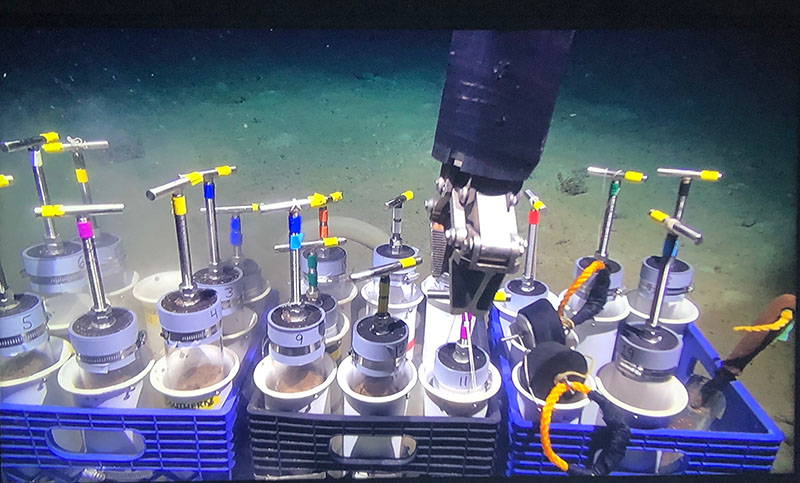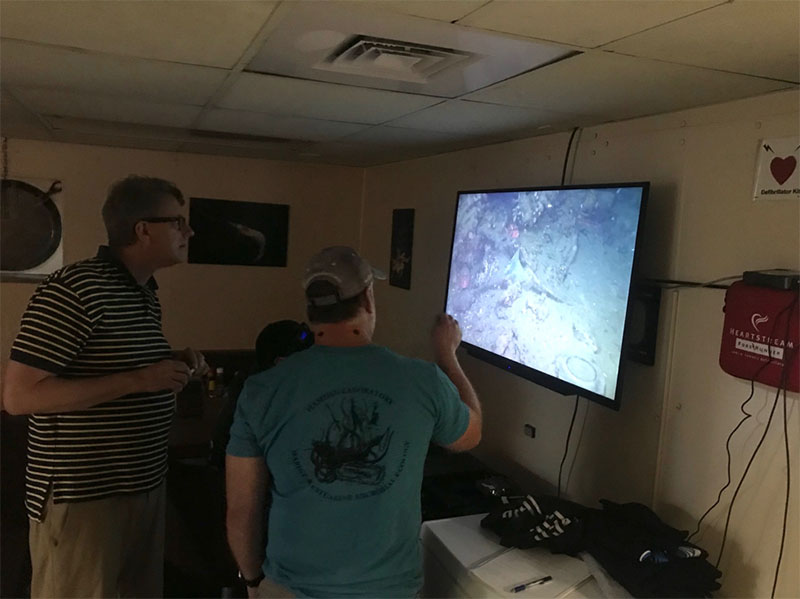
By Taylor Lee, Graduate Research Assistant, U.S. Naval Research Laboratory
July 1, 2019
Like any research cruise, there are a variety of scientists on board. For this cruise, most of the scientists on board are biologists and archaeologists, but I am of a different breed of scientist. I am a geologist. As a geologist, my specialty is getting my hands dirty in some good ole fashioned deep-sea mud. Typically, I come on research cruises to do just that, but I knew this cruise was going to be a little bit special. If you have been following along, you know that this cruise is an remotely operated vehicle (ROV) cruise, meaning that we don’t get to play in the mud much (unless there is an ROV core on deck!). Instead, many of us spend a fair amount watching the ROV camera from the common area where the snacks are bountiful.

Push core tubes headed down to the deep sea aboard the ROV. Image captured by ROV Odysseus, courtesy of Microbial Stowaways. Download larger version (jpg, 3.3 MB).
The first time we all gathered around the television to watch one of the two never-before-investigated shipwrecks we are exploring, I began to mentally ask a million questions. Questions such as: “What kind of artifacts will we find, and what would that tell us about the ship?” At first, I refrained from asking them aloud because it seemed that these questions should be obvious to someone who is pursuing a Ph.D. But then I thought about it and I realized there is nobody on this ship that knows everything—otherwise, why would we be on this ship?!
So, I started asking the questions. And when I started asking these questions, nobody thought they were outlandish, instead, they were ecstatic to get to talk about the research they are so passionate about. I started to get answers like “The artifacts will be able to help us create a historical profile for this unknown ship, for example, the anchor style may tell us it’s origin and ship’s purpose.”

BOEM Archeologist Doug Jones discussing with NRL Geophysicist Dr. Warren Wood various images seen at our shipwreck site of the day. Image courtesy of Microbial Stowaways. Download larger version (jpg, 429 KB).
I have found that there is someone on this ship that knows a lot about one specific thing while someone else may know something very specific about another thing. Sometimes when you finally ask the question, it ends up not having such a straightforward answer and causes a scientific brainstorming session. During my time in the common area, I’ve heard a lot of brainstorming sessions come from questions that someone may have been too afraid to ask.
In the end, we all came on the ship to learn something. It’s okay to ask the stupid questions because sometimes those are actually some of the most important questions.